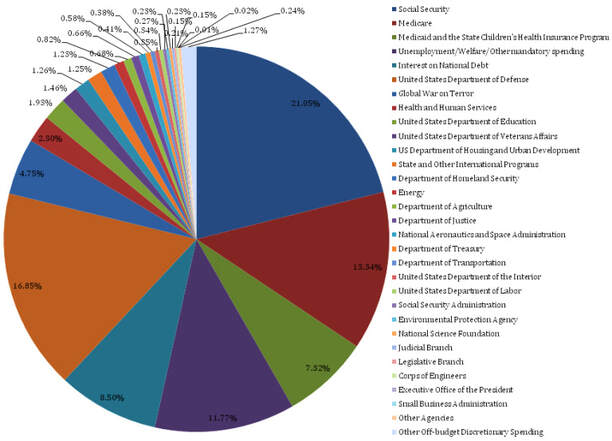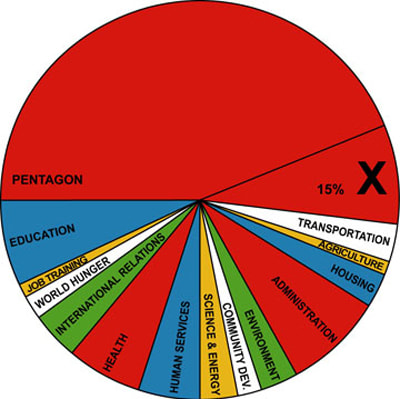- Home
-
Overview
- Study Guide
- The Single Most Important Idea
- Mission Statement
- War Is Not Inevitable keynote speech
- Capstone Essay: "To Abolish War"
- An Action Plan
- The Nine Cornerstones
- How Far We Have Already Come
- The Secret Ingredient
- The Vision Thing
- How Long It Will Take
- What You Can Do
- The AFWW Logo Explained
- Examples of War Expenses
- Biological Differences
- What Makes People Happy
- Map of Non-warring Cultures
- Cornerstones
- Videos
- Books
- Blog
- Project Enduring Peace
- About
- Related Projects
- Contact
|
By Judith Hand. Abolishing war is a massively complex project: the simple designation – Shift Our Economies – covers and lot of ground. In fact, each of the AFWW 9 cornerstones does so. This newsletter zeros in on one of many critical things that must be on our economics “to do” list: budgeting and spending, using the United States as an example. The principles apply, however, to the budgets of all nations. The above pie chart lays out the U.S. Budget – discretionary and non-discretionary – for 2009. The segments from the dark blue at the top right going around clockwise to the peacock blue at the bottom left are nondiscretionary spending (social security, medicare, medicaid, unemployment/welfare/other, and servicing national debt). These are allocated by law and the spending on them is not optional. The remaining pie slices are discretionary spending – other things considered sufficiently important to allocate tax money to them. It is in discretionary spending especially that we learn what our priorities are. U.S. Discretionary Spending What the U.S. spends on war—creating new weapons, producing them, waging wars, caring for the damaged lives of warriors afterwards—is the U.S. military budget, in red and call “Pentagon.” It is the budget of the Defense Department (or perhaps more correctly called by its original name, the War Department). The X stands for “emergency” war funding and other “black” projects that are not officially in the Defense budget. What is spent on preventing wars—foreign aid, diplomacy, education, spreading democracy, nurturing ties with allies—is found in the green sliver at the bottom left and called “International Relations.” It’s the budget of the State Department. It’s the amount the people apparently feel is worth putting into avoiding wars. Note that the small white wedge to its left is what budgeters feel it’s worth spending to end one of the big causes of war--hunger--a child of poverty. Any person who looks at this allocation and who knows that what you spend your money and time on is what you really care about and who knows that you cannot create a peaceful future by military means immediately knows at gut level that these proportions are totally out of whack if not insane. They are not rational. They are way more likely to lead to more wars. Sane people do not want wars—unless they stand to benefit financially greatly or acquire personal power. The problem is proportion, not eliminating the country’s Defense Department. Our strategy must include living in the world as it is now as we work toward positive transformation. The democracies must remain strong and orderly in a world where opponents want to destroy them. One of AFWW’s cornerstones, for this reason, is called “Provide Security and Order.” Realistically, the world needs, and into the foreseeable future will need, armed peacekeeping and peacemaking forces. It would be better if this was done by a well-funded international body, but the United Nations so far doesn’t’ adequately fill that task. It often falls to the United States, perhaps with allies, to provide serious peacekeeping services, and these are part of the “defense” budget. For example, U.S. military ships across the globe are critical to suppress rates of piracy….an increasing problem. Another example: many nations keep their military budgets low and can focus on other priorities (we’d like to think, worthy ones) because they have a defense treaty with the U.S.…they count on America to assist if they are invaded. This has even allowed some to voluntarily take advantage of unilateral demilitarization, most notably Costa Rica. There is no question that someone has to pay for peacekeeping, and some of what the U.S. spends serves that worthy goal. To repeat, the question is proportion. The current U.S. budget woefully lacks foresight or any evidence of a serious intent to prevent war. Which means, we need to be asking the question, “Just exactly who benefits greatly from the making of war.” We need to “follow the money”—the money trail and the desire for power. And we need to be honest and hard-nosed as we search. To abolish war, we must first understand its true causes. A major stumbling block, or barrier, in the search for what is true, is our strong human proclivity for either mass shared fantasy or mass self-delusion. The possibilities for its expression for either good or ill cannot be overstated. One delusion shared by many is that by making war it is possible to secure and maintain peace.
Unless we take special care, we can be easily flimflammed. War supporters use the media to distract our attention to superficial or even made-up causes—trunks and leaves—so that we don’t see the sustaining roots: a lust for power, dominance, and control over other people, usually by controlling vital or desirable resources. In warring societies, that drive characterizes a small minority, nearly always men, who are willing to kill to achieve dominant status and are able to convince others to support their agenda. They are the generators of war, a tail that has been wagging the dog of civilization for millennia. It’s time for the people, who in the end do the suffering, to spot these war mongers among us early on, and immediately deny them access to the tools of war. Once the blinders are off, it’s surprisingly easy to recognize them: they are anyone who in essence says, “In order to ‘solve this problem/keep us secure/protect liberty/give us access to the resources we desperately need to survive/spread the light of our religion/et cetera' we must go kill those other people.” Not talk to them, or negotiate with them, or share the world’s natural wealth with them, or allow them to live as they see fit so long as it is in peace—no, we must kill them. Our budget priorities reflect our beliefs and intention.
0 Comments
Leave a Reply. |
Follow Me on Facebook
If you'd like to read my take on current affairs, or get a sense of what amuses me or I find educational or beautiful, do a search and follow me, Judith Hand, on Facebook. About the AuthorDr. Judith L. Hand. Dr. Hand earned her Ph.D. in biology from UCLA. Her studies included animal behavior and primatology. After completing a Smithsonian Post-doctoral Fellowship at the National Zoo in Washington, D.C., she returned to UCLA as a research associate and lecturer. Her undergraduate major was in cultural anthropology. She worked as a technician in neurophysiology laboratories at UCLA and the Max Planck Institute, in Munich, Germany. As a student of animal communication, she is the author of several books and scientific papers on the subject of social conflict resolution.
Categories
All
Archives
November 2019
|
A Future Without War
Believe in it. Envision it. Work for it.
And we will achieve it.
Believe in it. Envision it. Work for it.
And we will achieve it.
AFWW is continually developed and maintained by Writer and Evolutionary Biologist Dr. Judith Hand.
Earth image courtesy of the Image Science & Analysis Laboratory, NASA Johnson Space Center. Photo Number AS17-148-22727 eol.jsc.nasa.gov
©2005-2019 A Future Without War. All rights reserved. Login
Earth image courtesy of the Image Science & Analysis Laboratory, NASA Johnson Space Center. Photo Number AS17-148-22727 eol.jsc.nasa.gov
©2005-2019 A Future Without War. All rights reserved. Login
- Home
-
Overview
- Study Guide
- The Single Most Important Idea
- Mission Statement
- War Is Not Inevitable keynote speech
- Capstone Essay: "To Abolish War"
- An Action Plan
- The Nine Cornerstones
- How Far We Have Already Come
- The Secret Ingredient
- The Vision Thing
- How Long It Will Take
- What You Can Do
- The AFWW Logo Explained
- Examples of War Expenses
- Biological Differences
- What Makes People Happy
- Map of Non-warring Cultures
- Cornerstones
- Videos
- Books
- Blog
- Project Enduring Peace
- About
- Related Projects
- Contact




 RSS Feed
RSS Feed